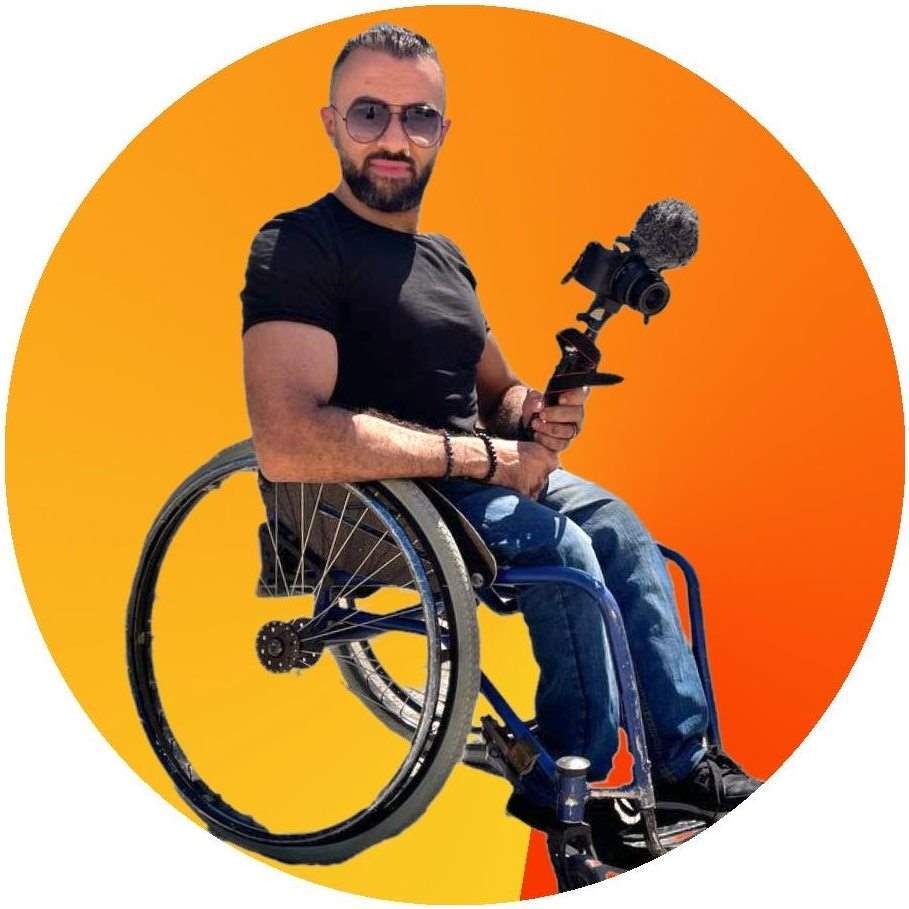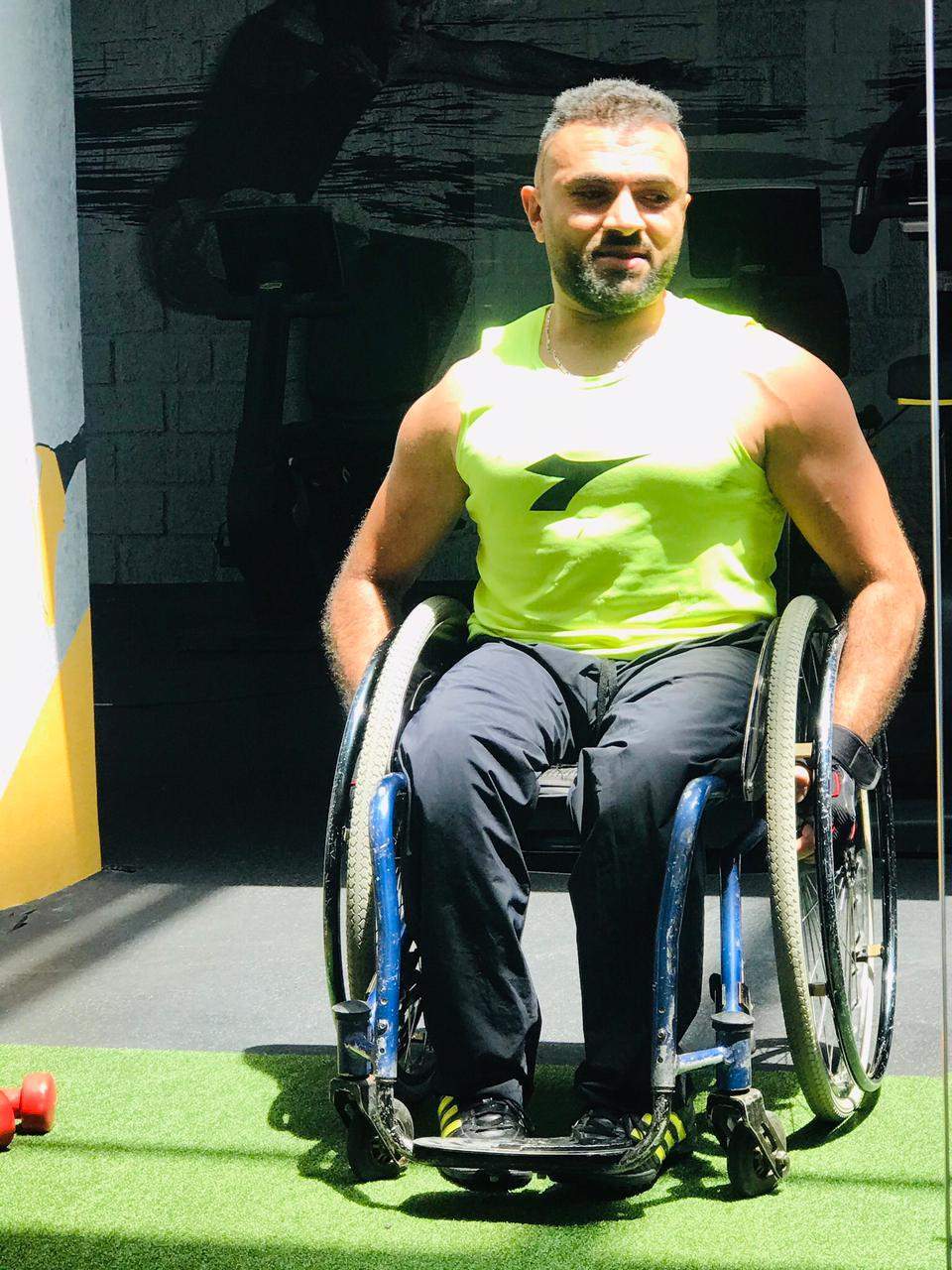AMMAN — “In this world, you
do not get what you deserve; you get what you fight for.” With a simple,
direct, and comedic manner, 36-year-old Ezzat Nabil Dablan fights stereotypes of
and social conventions on people with
disabilities through his short outreach videos.
اضافة اعلان
 (Photo: Handouts from Ezzat Nabil Dablan)
(Photo: Handouts from Ezzat Nabil Dablan)
Sharing his daily
experiences, Dablan proves how people with disabilities live just like everyone
else. “The society is not realizing our abilities or what we can actually do,”
he told
Jordan News in a phone interview.
Videos on his YouTube
channel include “Visiting Beaches,” “Houses of Worship,” “Basketball Courts,”
“How #Disabled Drive,” “Travel for People with Disabilities” “Elections and
Voting,” “On the Sidewalk, Pedestrian Footbridges, and Tunnels”.
Dablan is a content creator and social media influencer who was born with Osteogenesis Imperfecta (OI), a condition that affected his motor abilities. Dablan, a father of one, holds a bachelor’s degree in marketing from Applied Science Private University, where he ranked fourth in his class and 14th nationwide
Dablan went to a boarding
school for people with disabilities during his primary education. He faced new
obstacles in the subsequent phases of his life. Enrolling in secondary school
was not easy, and he faced bullying during college. “Surprisingly, the bullies
were never my colleagues, but rather the university professors,” Dablan said.
He explained that his professors, and later his employers, would underestimate
him.
A story that circulated
on social media of a mother whose son’s school application was rejected due to
his medical condition touched Dablan’s heart. It inspired him to use his own
voice to raise awareness. Online he witnessed people’s ignorance of the rights
of people with disabilities.
From here, the idea of
Ezzat Experience dubbed “Tajrobet Ezzat” was born. Within two years he had
turned his 500 friends into an audience of 36,000 followers on
Facebook, with over
14,000 views on YouTube, and similar numbers on Instagram and TikTok.
After spontaneously
filming his first video on his phone, Dablan realized the impact he could have
if he were to invest more time and effort. Building on his knowledge of
e-marketing, he enrolled himself in “a nine-month course to properly learn how
to edit and montage videos” and bought high-quality equipment to ensure that his
message and content was well-perceived.
 (Photo: Handouts from Ezzat Nabil Dablan)
(Photo: Handouts from Ezzat Nabil Dablan)
“It is all about
constructive criticism,” Dablan said. What distinguishes his content is that Dablan does not only spot problems and obstacles people
with disabilities face but also suggests practical solutions and
recommendations.
The influencer spoke of
the crumbling infrastructure and the lack of accessibility at almost all
levels. “Our simplest right to accessing schools, hospitals, mosques, markets, and
malls is restricted, given that most are not accessible,” Dablan said. He discussed
how solutions can be very simple, citing an example of “a costless ramps beside
the stairs can ease distress for people with motors disabilities.”
Dablan uses his platform
to speak out the ignorance and negligence he witnesses. In a video he recounted
how a supermarket had closed their wheelchair ramps with chains. Owing to the
public pressure, particularly on TikTok, the management removed the chains and
expressed their regret,” he said.
In his
latest videos,
Dablan examined the Bus Rapid Transit project issues. He pointed out the shortcomings
of the implementation of tactile paving, a paving system used to assist
visually impaired pedestrians. “The textured pavement used by people with
visual impairment to be their eye on streets and warn of any dangers may itself
lead to accidents due to errors,” Dablan said, explaining that “It is a
disaster to find a manhole or traffic light in the middle of the pavement. Not
to mention how some lead to a wall!”
Learning through
experience is a notion the influencer adopted to creatively educate society of
obstacles people with disabilities face. “Chair Challenge” is a series Dablan created
to give individuals a chance to be in his shoes and discover for themselves the
difficulty of using a wheelchair in our community. The series has “gained
increasing attention,” he added.
Dablan also spoke of
disability etiquette. “I am totally against teaching people that they need to
deal with us in a certain way. We do not have a different etiquette; it is
unified for all. We are all humans.” Instead, he promotes broad-mindedness to
show that natural diversity is the key.
Summarizing some of the problems
of people with disabilities, Dablan stressed society’s misperception of them,
and the overall failure to comply with the laws set to protect the rights of
people with disabilities. “The law that was approved in 2007 tackled all the details,
but unfortunately it is not applied,” he explained.
Therefore, he aims to
influence public opinion and raise awareness to lead a movement towards
implementing legislation meant to guarantee the rights of people with
disabilities. “If our humanitarian demands are boosted by grassroots support,
our voices will be heard,” Dablan said.
Read more Lifestyle




